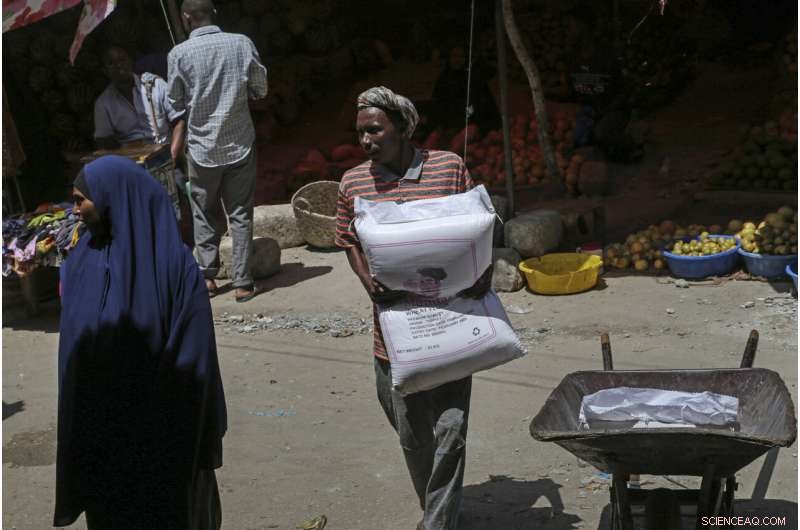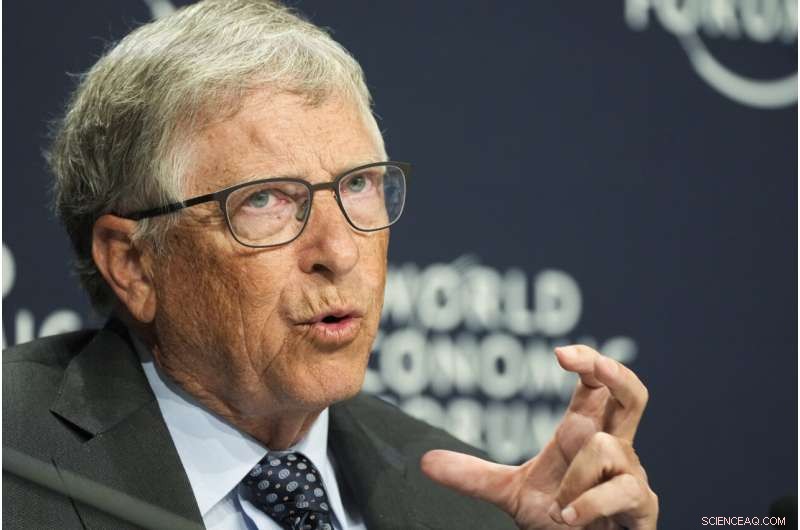
Un hombre lleva un saco de harina de trigo importada de Turquía en el mercado Hamar-Weyne en la capital Mogadishu, Somalia el jueves 26 de mayo de 2022. Bill Gates instó a los líderes mundiales a no renunciar a los objetivos que establecieron para reducir el hambre y la pobreza a pesar de enormes contratiempos recientes documentados en un nuevo informe publicado el martes 13 de septiembre por la Fundación Bill y Melinda Gates. Crédito:AP Photo/Farah Abdi Warsameh, Archivo
Bill Gates dice que la crisis mundial del hambre es tan inmensa que la ayuda alimentaria no puede abordar el problema por completo. Lo que también se necesita, argumenta Gates, son los tipos de innovaciones en tecnología agrícola que ha financiado durante mucho tiempo para tratar de revertir la crisis documentada en un informe publicado el martes por la Fundación Bill y Melinda Gates.
Gates señala, en particular, un avance que él llama "semillas mágicas", cultivos diseñados para adaptarse al cambio climático y resistir las plagas agrícolas. La Fundación Gates también publicó el martes un mapa que modela cómo el cambio climático probablemente afectará las condiciones de crecimiento de los cultivos en varios países para resaltar la necesidad urgente de acción.
Al asignar a la tecnología un papel preeminente para abordar la crisis alimentaria mundial, Gates se enfrenta a los críticos que dicen que sus ideas entran en conflicto con los esfuerzos mundiales para proteger el medio ambiente. Señalan que tales semillas generalmente necesitan pesticidas y fertilizantes a base de combustibles fósiles para crecer.
Los críticos también sostienen que el enfoque de Gates no aborda la urgencia de la crisis. El desarrollo de "semillas mágicas" lleva años y no brindará alivio inmediato a los países que actualmente sufren un sufrimiento generalizado porque dependen de las importaciones de alimentos o están experimentando sequías históricas.
Es un debate que podría intensificar la presión internacional para alcanzar los objetivos compartidos para la paz y la prosperidad mundial, conocidos como los Objetivos de Desarrollo Sostenible de la ONU, antes de la fecha límite de 2030. Los 17 objetivos incluyen acabar con la pobreza y el hambre, luchar contra el cambio climático, proporcionar acceso a agua limpia, trabajar por la igualdad de género y reducir la desigualdad económica.
"Es bastante sombrío en relación con nuestras esperanzas para 2030", dijo Gates, de 66 años, en una entrevista con The Associated Press. Sin embargo, agregó:"Soy optimista de que podamos volver a la normalidad".
Gates señaló la guerra en Ucrania y la pandemia como las principales causas del empeoramiento de la crisis del hambre. Pero su mensaje a otros donantes y líderes mundiales que se reunirán en la Asamblea General de la ONU este septiembre es que la ayuda alimentaria no será suficiente.
"Es bueno que la gente quiera evitar que sus congéneres mueran de hambre cuando conflictos como el de Ucrania interrumpen el suministro de alimentos", escribe Gates en el nuevo informe. Pero el verdadero problema, dice, es que muchos países con inseguridad alimentaria no producen suficientes alimentos para sí mismos, un problema que seguramente se verá exacerbado por las consecuencias del cambio climático.
"La temperatura sigue subiendo", dijo Gates. "No hay forma, sin innovación, de acercarse siquiera a alimentar a África. Quiero decir, simplemente no funciona".
Como lo ha hecho durante más de 15 años, Gates pidió invertir en investigación agrícola, destacando las semillas de maíz que prosperan a temperaturas más altas y en condiciones más secas que otras variedades. Esas semillas fueron desarrolladas bajo un programa de la Fundación Africana de Tecnología Agrícola a la que la fundación ha donado $131 millones desde 2008.
Desde entonces, la Fundación Gates ha gastado 1500 millones de dólares en subvenciones centradas en la agricultura en África, según Candid, una organización sin fines de lucro que investiga las donaciones filantrópicas. La Fundación Bill y Melinda Gates es, en cierta medida, la fundación privada más grande del mundo y es mejor conocida por su trabajo en salud global, incluidas las vacunas. Comenzó en su forma actual en 2000, después de que Gates dejara su puesto de director ejecutivo en Microsoft, el gigante tecnológico que cofundó. Forbes estima que su patrimonio neto ronda los 129.000 millones de dólares.
The foundation's spending on agricultural development is why Gates' view on how countries should respond to food insecurity has taken on heightened importance in a year when a record 345 million people around the world are acutely hungry. The World Food Program said in July that tally represents an increase of 25% from before Russia invaded Ukraine in February and a 150% jump from before the pandemic struck in the spring of 2020.
In Ghana, field trials for four varieties of modified seeds began in 2013. But only this past summer has one been approved for commercialization, said Joeva Rock of the University of Cambridge. Activists there, she said, have asked whether those resources could have been better spent elsewhere.
"What would happen if those went into increasing funds to the national research centers in Ghana, to building roads, to building storage, to building silos or helping to build markets?" said Rock, who has written a book about food sovereignty in the country.
When asked, Gates acknowledged the importance of infrastructure like roads and other transportation systems.
"If you want your inputs like fertilizer to come in, if you want your output to go out, it's just too expensive in Africa without that infrastructure," he said, adding that building and maintaining roads is highly expensive.

Bill Gates, Co-Chair, Bill &Melinda Gates Foundation, speaks at a news conference during the World Economic Forum in Davos, Switzerland, Wednesday, May 25, 2022. Gates urged world leaders not to give up on the goals they set to reduce hunger and poverty despite huge recent setbacks documented in a new report released Tuesday, Sept. 13 by The Bill and Melinda Gates Foundation. Credit:AP Photo/Markus Schreiber, File
Some researchers question the wisdom of pursuing the fundamental premise that Gates has embraced:Increasing agricultural production through the use of modified seeds along with fertilizers and pesticides. They point to the environmental footprint of industrial agriculture, including the use of fossil fuel-based fertilizers, the degradation of soil quality and the diminishing of biodiversity.
Alternatives could include agroecological interventions, like developing locally managed seed banks, composting systems to promote soil health and pesticide interventions that don't rely on chemicals, experts said. Over time, those approaches can reduce the need for food aid and build more resilient farming systems, according to Rachel Bezner Kerr, a professor of global development at Cornell University.
Kerr, a lead author of the food chapter of the latest report from the International Panel on Climate Change, said that while the panel doesn't make recommendations, "overall, the kind of focus on a few technologies and reliance on fossil fuel-based inputs isn't in line with ecosystem-based adaptation" or a biodiverse future.
Mark Suzman, CEO of the Gates Foundation, defends its approach warning that limiting access to fertilizers means farmers cannot increase their yields.
"Fertilizer is necessary. You simply cannot meet the overall productivity gains without it," Suzman said, speaking on a call with reporters.
In his interview with the AP, Gates himself dismissed criticisms of the foundation's emphasis on modified seeds.
"If there's some non-innovation solution, you know, like singing 'Kumbaya,' I'll put money behind it," Gates said. "But if you don't have those seeds, the numbers just don't work." He added, "If somebody says we're ignoring some solution, I don't think they're looking at what we're doing."
Another project the foundation has funded is the development of computer models that try to measure crop loss caused by disease or pests. The idea is to direct research and responses to where they are needed most.
"It's not just, how do we get through this crisis and get back to normal? It's, what does the future normal look like?" said Cambria Finegold, the director of digital development for CABI, an intergovernmental nonprofit that is developing the models.
Melinda French Gates, the other co-chair of the Gates Foundation, highlighted in a separate letter the halting progress toward gender equity worldwide. Since January, the foundation has expanded its board, adding six new members to help direct its work, a move that followed the announcement of the Gateses' divorce last summer.
French Gates has agreed to step down after two years if the two decided they could not continue to work together. French Gates, who also founded an investment organization called Pivotal Ventures, was not available for an interview.
Gates said he is lucky that his former wife has continued to put her time and energy into the foundation. In July, Gates said he would contribute $20 billion to the foundation in response to the significant setbacks caused by the pandemic, raising its endowment to approximately $70 billion.
Through his giving, investments and public speaking, Gates has held the spotlight in recent years, especially on the topics of vaccines and climate change. But he has also been the subject of conspiracy theories that play off his role as a developer of new technologies and his place among the highest echelons of the wealthy and powerful.
Gates said he does not spend time thinking about conspiracies and that his foundation's work has nothing to do with his personal reputation.
"If you go into these countries, they've never heard of me or the foundation," Gates said. "Maybe in the rich world somebody is reading some internet thing, but the people we care about have never, will never, and it's not important that they ever know who I am."
© 2022 Prensa Asociada. Reservados todos los derechos. Este material no se puede publicar, transmitir, reescribir ni redistribuir sin permiso. Gates:Foundation to invest $5B in Africa over next 5 years